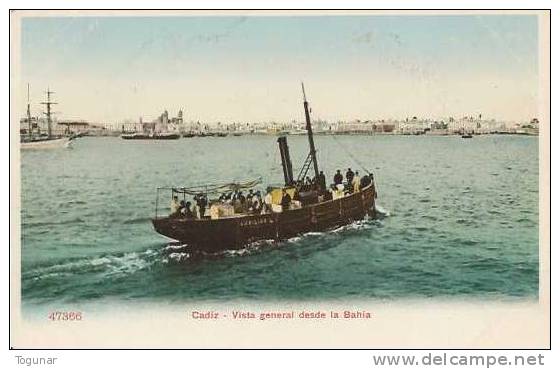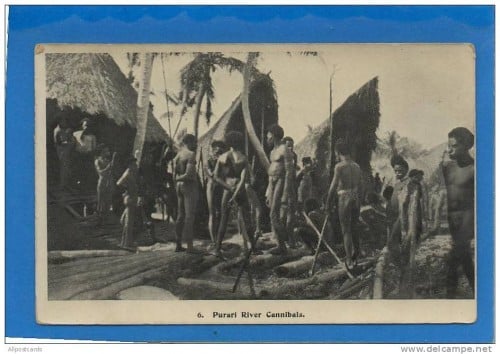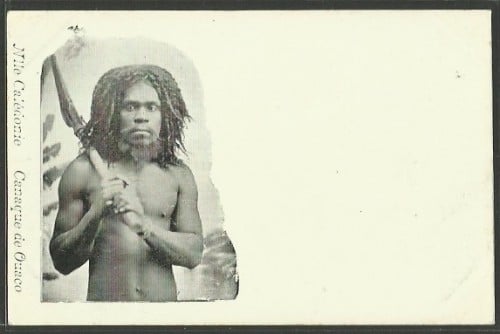The Fourth Man (2)
By:
April 25, 2015

From the nineteen-teens until his death in 1956, American author and explorer John Russell wrote dozens of adventure yarns for such magazines as The Golden Book, Argosy, and The Saturday Evening Post. I first came across “The Fourth Man” (Collier’s, Jan 6. 1917) in The Pocket Book of Adventure Stories (1945, ed. Philip Van Doren Stern), when I was an adolescent in the early ’80s. It’s one of the greatest tales of suspense ever. Enjoy!
“Wait till you’ve got your two feet on a pave, my boy. That will be the time to talk of freedom. What? Suppose there came a storm.”
“It is not the season of storms,” observed Dubosc.
But The Parrot’s word had given them a check. Such spirits as these, to whom the land had been a horror, would be slow to feel the terror of the sea. Back there they had left the festering limbo of a convict colony, oblivion. Out here they had reached the rosy threshold of the big round world again. They were men raised from the dead, charged with all the furious appetites of lost years, with the savor of life strong and sweet on their lips. And yet they paused and looked about in quickened perception, with the clutch at the throat that takes the landsman on big waters. The spaces were so wide and empty. The voices in their ears were so strange and murmurous. There was a threat in each wave that came from the depths, a sinister vibration. None of them knew the sea. None knew its ways, what tricks it might play, what traps it might spread — more deadly than those of the jungle.
The raft was running now before a brisk chop with alternate spring and wallow, while the froth bubbled in over the prow and ran down among them as they sat. “Where is that cursed ship that was to meet us here?” demanded Fenayrou.

“It will meet us right enough.” Dubosc spoke carelessly, though behind the blown wisp of his cigarette he had been searching the outer horizon with keen glance. “This is the day, as agreed. We will be picked up off the mouth of the river.”
“You say,” growled Perroquet. “But where is any river now? Or any mouth? Sacred name! this wind will blow us to China if we keep on.”
“We dare not lie in any closer. There is a government launch at Torrien. Also the traders go armed hereabouts, ready for chaps like us. And don’t imagine that the native trackers have given us up. They are likely to be following still in their proas.”
“So far!”
Fenayrou laughed, for The Parrot’s dread of their savage enemies had a morbid tinge.
“Take care, Perroquet. They will eat you yet.”
“Is it true?” demanded the other, appealing to Dubosc. “I have heard it is even permitted these devils to keep all runaways they can capture — Name of God! — to fatten on.”

“An idle tale,” smiled Dubosc. “They prefer the reward. But one hears of convicts being badly mauled. There was a forester who made a break from Baie du Sud and came back lacking an arm. Certainly these people have not lost the habit of cannibalism.”
“Piecemeal,” chuckled Fenayrou. “They will only sample you, Perroquet. Let them make a stew of your brains. You would miss nothing.”
But The Parrot swore.
“Name of a name — what brutes!” he said, and by a gesture recalled the presence of that fourth man who was of their party and yet so completely separated from them that they had almost forgotten him.
The Canaque was steering the raft. He sat crouched at the stern, his body glistening like varnished ebony with spray. He held the steering paddle, immobile as an image, his eyes fixed upon the course ahead.
There was no trace whatever of expression on his face, no hint of what he thought or felt or whether he thought or felt anything. He seemed not even aware of their regard, and each one of them experienced somehow that twinge of uneasiness with which the white always confronts his brother of color — this enigma brown or yellow or black he is fated never wholly to understand or to fathom….
“It occurs to me,” said Fenayrou, in a pause, “that our friend here who looks like a shiny boot is able to steer us God knows where. Perhaps to claim the reward.”

“Reassure yourself,” answered Dubosc. “He steers by my order. Besides, it is a simple creature — an infant, truly, incapable of any but the most primitive reasoning.”
“Is he incapable of treachery?”
“Of any that would deceive us. Also, he is bound by his duty. I made my bargain with his chief, up the river, and this one is sent to deliver us on board our ship. It is the only interest he has in us.”
“And he will do it?”
“He will do it. Such is the nature of the native.”
“I am glad you feel so,” returned Fenayrou, adjusting himself indolently among the drier reeds and nursing the last of his cigarette. “For my part I wouldn’t trust a figurehead like that for two sous. Mazette! What a monkey face!”
“Brute!” repeated Perroquet, and this man, sprung from some vile river-front slum of Argenteuil, whose home had been the dock pilings, the grog shop, and the jail, even this man viewed the black Canaque from an immeasurable distance with the look of hatred and contempt….
RADIUM AGE SCIENCE FICTION: “Radium Age” is HILOBROW’s name for the 1904–33 era, which saw the discovery of radioactivity, the revelation that matter itself is constantly in movement — a fitting metaphor for the first decades of the 20th century, during which old scientific, religious, political, and social certainties were shattered. This era also saw the publication of genre-shattering writing by Edgar Rice Burroughs, Sax Rohmer, E.E. “Doc” Smith, Jack London, Arthur Conan Doyle, Aldous Huxley, Olaf Stapledon, Karel Čapek, H.P. Lovecraft, Charlotte Perkins Gilman, Yevgeny Zamyatin, Philip Gordon Wylie, and other pioneers of post-Verne/Wells, pre-Golden Age “science fiction.” More info here.
READ GORGEOUS PAPERBACKS: HiLoBooks has reissued the following 10 obscure but amazing Radium Age science fiction novels in beautiful print editions: Jack London’s The Scarlet Plague, Rudyard Kipling’s With the Night Mail (and “As Easy as A.B.C.”), Arthur Conan Doyle’s The Poison Belt, H. Rider Haggard’s When the World Shook, Edward Shanks’ The People of the Ruins, William Hope Hodgson’s The Night Land, J.D. Beresford’s Goslings, E.V. Odle’s The Clockwork Man, Cicely Hamilton’s Theodore Savage, and Muriel Jaeger’s The Man with Six Senses. For more information, visit the HiLoBooks homepage.
SERIALIZED BY HILOBOOKS: Jack London’s The Scarlet Plague | Rudyard Kipling’s With the Night Mail (and “As Easy as A.B.C.”) | Arthur Conan Doyle’s The Poison Belt | H. Rider Haggard’s When the World Shook | Edward Shanks’ The People of the Ruins | William Hope Hodgson’s The Night Land | J.D. Beresford’s Goslings | E.V. Odle’s The Clockwork Man | Cicely Hamilton’s Theodore Savage | Muriel Jaeger’s The Man With Six Senses | Jack London’s “The Red One” | Philip Francis Nowlan’s Armageddon 2419 A.D. | Homer Eon Flint’s The Devolutionist | W.E.B. DuBois’s “The Comet” | Edgar Rice Burroughs’s The Moon Men | Charlotte Perkins Gilman’s Herland | Sax Rohmer’s “The Zayat Kiss” | Eimar O’Duffy’s King Goshawk and the Birds | Frances Hodgson Burnett’s The Lost Prince | Morley Roberts’s The Fugitives | Helen MacInnes’s The Unconquerable | Geoffrey Household’s Watcher in the Shadows | William Haggard’s The High Wire | Hammond Innes’s Air Bridge | James Branch Cabell’s Jurgen | John Buchan’s “No Man’s Land” | John Russell’s “The Fourth Man” | E.M. Forster’s “The Machine Stops” | John Buchan’s Huntingtower | Arthur Conan Doyle’s When the World Screamed | Victor Bridges’ A Rogue By Compulsion | Jack London’s The Iron Heel | H. De Vere Stacpoole’s The Man Who Lost Himself | P.G. Wodehouse’s Leave It to Psmith | Richard Connell’s “The Most Dangerous Game” | Houdini and Lovecraft’s “Imprisoned with the Pharaohs” | Arthur Conan Doyle’s “The Sussex Vampire”.
ORIGINAL FICTION: HILOBROW has serialized three novels: James Parker’s The Ballad of Cocky The Fox (“a proof-of-concept that serialization can work on the Internet” — The Atlantic); Karinne Keithley Syers’s Linda Linda Linda (which includes original music); and Robert Waldron’s roman à clef The School on the Fens. We also publish original stories and comics. These include: Matthew Battles’s stories “Gita Nova“, “Makes the Man,” “Imago,” “Camera Lucida,” “A Simple Message”, “Children of the Volcano”, “The Gnomon”, “Billable Memories”, “For Provisional Description of Superficial Features”, “The Dogs in the Trees”, “The Sovereignties of Invention”, and “Survivor: The Island of Dr. Moreau”; several of these later appeared in the collection The Sovereignties of Invention | Peggy Nelson’s “Mood Indigo“, “Top Kill Fail“, and “Mercerism” | Annalee Newitz’s “The Great Oxygen Race” | Flourish Klink’s Star Trek fanfic “Conference Comms” | Charlie Mitchell’s “A Fantasy Land” | Charlie Mitchell’s “Sentinels” | Joshua Glenn’s “The Lawless One”, and the mashup story “Zarathustra vs. Swamp Thing” | Adam McGovern and Paolo Leandri’s Idoru Jones comics | John Holbo’s “Sugarplum Squeampunk” | “Another Corporate Death” (1) and “Another Corporate Death” (2) by Mike Fleisch | Kathryn Kuitenbrouwer and Frank Fiorentino’s graphic novel “The Song of Otto” (excerpt) | John Holbo’s graphic novel On Beyond Zarathustra (excerpt) | “Manoj” and “Josh” by Vijay Balakrishnan | “Verge” by Chris Rossi, and his audio novel Low Priority Hero | EPIC WINS: THE ILIAD (1.408-415) by Flourish Klink | EPIC WINS: THE KALEVALA (3.1-278) by James Parker | EPIC WINS: THE ARGONAUTICA (2.815-834) by Joshua Glenn | EPIC WINS: THE MYTH OF THE ELK by Matthew Battles | TROUBLED SUPERHUMAN CONTEST: Charles Pappas, “The Law” | CATASTROPHE CONTEST: Timothy Raymond, “Hem and the Flood” | TELEPATHY CONTEST: Rachel Ellis Adams, “Fatima, Can You Hear Me?” | OIL SPILL CONTEST: A.E. Smith, “Sound Thinking | LITTLE NEMO CAPTION CONTEST: Joe Lyons, “Necronomicon” | SPOOKY-KOOKY CONTEST: Tucker Cummings, “Well Marbled” | INVENT-A-HERO CONTEST: TG Gibbon, “The Firefly” | FANFICTION CONTEST: Lyette Mercier’s “Sex and the Single Superhero”
